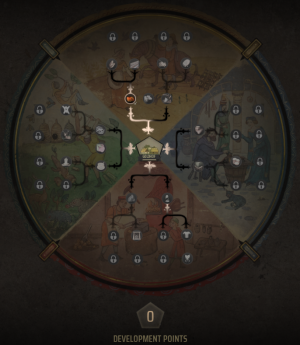⚠ NOTICE
The game has been released in Early Access on 26th of April, 2024.
Please keep in mind that any information provided on this Wiki may be incomplete or subject to change as the game progresses.
Development: Difference between revisions
From Manor Lords Official Wiki
(Created page with "Each region has a Settlement Level, determined by the number and level of Burgage Plots. All regions start at settlement level 1: Small Village. * Level 2 (Small Village) requires 5 Burgage Plots of level 1. * Level 3 (Medium Village) requires 5 Burgage Plots of level 1 and 2 Burgage Plots of level 2. * Level 4 (Large Village) requires 10 Burgage Plots of level 1 and 5 Burgage Plots of level 2. Each time a region increases its Settlement Level it grants a Development Po...") |
No edit summary |
||
| (8 intermediate revisions by 3 users not shown) | |||
| Line 1: | Line 1: | ||
Each region has a | <languages/> | ||
* Level 2 (Small | [[File:Development Trees.png|thumb|300px|<translate><!--T:1--> The development trees in early access</translate>]] | ||
* Level 3 (Medium | <translate> | ||
* Level 4 (Large | <!--T:2--> | ||
Each region has a settlement level, determined by the number and level of [[{{tl}}Burgage plot|burgage plots]]. All regions start at settlement level 1: Small village. | |||
* Level 2 (Small village) requires 5 burgage plots of level 1. | |||
* Level 3 (Medium village) requires 5 burgage plots of level 1 and 2 burgage plots of level 2. | |||
* Level 4 (Large village) requires 10 burgage plots of level 1 and 5 burgage plots of level 2. | |||
Each time | <!--T:3--> | ||
Each region also has a "development". Each time its settlement level increases, the region will gain a development point, which can be used to unlock new buildings or upgrades or make existing ones more efficient. There are 4 development trees, each one with 10 or 11 development branches. | |||
== Farming development tree == <!--T:4--> | |||
<!--T:5--> | |||
{| class="wikitable" | {| class="wikitable" | ||
| colspan=2 width=33% | '''Orchardry'''<br>New backyard extension: Apple orchard | |||
| colspan=2 width=33% | '''Orchardry'''<br>New backyard extension: Apple | |||
| colspan=2 width=33% | '''Sheepbreeding'''<br>Sheep grazing on the pastures slowly multiply. | | colspan=2 width=33% | '''Sheepbreeding'''<br>Sheep grazing on the pastures slowly multiply. | ||
| colspan=2 width=33% | '''Heavy | | colspan=2 width=33% | '''Heavy plow'''<br>Farmhouse upgrade: Add a plowing station | ||
|- | |- | ||
| width=25% | '''Rye Cultivation'''<br>New crop: Rye. Identical to | | width=25% | '''Rye Cultivation'''<br>New crop: {{Icon|rye}} Rye. Identical to {{Icon|wheat}} wheat and can be grown in places with lower fertility. | ||
| colspan=2 width=25% | '''Irrigation'''<br>Dramatically lowers the amount of damage caused by Droughts. | | colspan=2 width=25% | '''Irrigation'''<br>Dramatically lowers the amount of damage caused by [[{{tl}}Droughts|droughts]]. | ||
| colspan=2 width=25% | '''Fertilization'''<br>Field upgrade: Fence up | | colspan=2 width=25% | '''Fertilization'''<br>Field upgrade: Fence up | ||
| width=25% | '''Bakeries'''<br>New backyard extension: Bakery | | width=25% | '''Bakeries'''<br>New backyard extension: Bakery extension | ||
|- | |- | ||
| work in progress | | work in progress | ||
| Line 23: | Line 30: | ||
|} | |} | ||
== Trade development tree == <!--T:6--> | |||
<!--T:7--> | |||
{| class="wikitable" | {| class="wikitable" | ||
| colspan=2 | '''Foreign suppliers'''<br>New building: Firewood cart<br>New building: Food cart | |||
| colspan=2 | '''Trade logistics'''<br>Establishing a new trade route always costs a maximum of 25 [[{{tl}}Regional wealth|regional wealth]]. | |||
| colspan=2 | '''Foreign | |||
| colspan=2 | '''Trade | |||
|- | |- | ||
| width=25% | work in progress | | width=25% | work in progress | ||
| width=25% | work in progress | | width=25% | work in progress | ||
| width=25% | '''Better | | width=25% | '''Better deals'''<br>Reduces import costs by 10. | ||
| width=25% | work in progress | | width=25% | work in progress | ||
|- | |- | ||
| Line 40: | Line 48: | ||
|} | |} | ||
== Industry development tree == <!--T:8--> | |||
<!--T:9--> | |||
{| class="wikitable" | {| class="wikitable" | ||
| colspan=2 | '''Basic armormaking'''<br>New backyard extension: Armorer's workshop | |||
| colspan=2 | '''Charcoal burning'''<br>New building: [[{{tl}}Charcoal kiln|Charcoal kiln]] | |||
| colspan=2 | '''Basic | |||
| colspan=2 | '''Charcoal | |||
|- | |- | ||
| width=25% | '''Advanced | | width=25% | '''Advanced armormaking'''<br>Armorer's workshop can produce {{Icon|mail armor}} mail armor, which can be used to equip citizens of burgage plots of level 3 and above, or promoting a new [[{{tl}}Warfare#Unit_types|retinue]]. | ||
| width=25% | work in progress | | width=25% | work in progress | ||
| width=25% | '''Deep | | width=25% | '''Deep mining'''<br>[[{{tl}}Mining pit|Mining pit]] upgrade: Deep mine | ||
| width=25% | work in progress | | width=25% | work in progress | ||
|- | |- | ||
| '''Master Armormaking'''<br>Armorer's | | '''Master Armormaking'''<br>Armorer's workshop can produce {{Icon|plate armor}} plate armor, which can in turn be used to upgrade the retinue. | ||
| work in progress | | work in progress | ||
| work in progress | | work in progress | ||
| Line 57: | Line 66: | ||
|} | |} | ||
== Gathering development tree == <!--T:10--> | |||
<!--T:11--> | |||
{| class="wikitable" | {| class="wikitable" | ||
| colspan=2 width=33% | '''Beekeeping'''<br>New building: [[{{tl}}Apiary|Apiary]] | |||
| colspan=2 width=33% | '''Forest Management'''<br>Doubles capacity of all {{Icon|berries}} berry deposits. | |||
| colspan=2 width=33% | '''Beekeeping'''<br>New building: Apiary | | colspan=2 width=33% | '''Trapping'''<br>Enables hunters to skillfully lay traps in the forest, which gives a passive income of {{Icon|meat}} meat. | ||
| colspan=2 width=33% | '''Forest Management'''<br>Doubles capacity of all | |||
| colspan=2 width=33% | '''Trapping'''<br>Enables hunters to skillfully lay traps in the forest, which gives a passive income of | |||
|- | |- | ||
| width=25% | work in progress | | width=25% | work in progress | ||
| colspan=2 width=25% | '''Advanced | | colspan=2 width=25% | '''Advanced beekeeping'''<br>Apiaries also produce {{Icon|wax}} wax. | ||
| colspan=2 width=25% | '''Advanced | | colspan=2 width=25% | '''Advanced skinning'''<br>Doubles the amount of meat harvested by hunters and butchers and from goat pens. | ||
| width=25% | '''Pelt | | width=25% | '''Pelt extraction'''<br>Hunters also collect {{Icon|hides}} hides from traps. | ||
|- | |- | ||
| work in progress | | work in progress | ||
| Line 74: | Line 84: | ||
| work in progress | | work in progress | ||
|} | |} | ||
</translate> | |||
Latest revision as of 18:08, 18 May 2024
Each region has a settlement level, determined by the number and level of burgage plots. All regions start at settlement level 1: Small village.
- Level 2 (Small village) requires 5 burgage plots of level 1.
- Level 3 (Medium village) requires 5 burgage plots of level 1 and 2 burgage plots of level 2.
- Level 4 (Large village) requires 10 burgage plots of level 1 and 5 burgage plots of level 2.
Each region also has a "development". Each time its settlement level increases, the region will gain a development point, which can be used to unlock new buildings or upgrades or make existing ones more efficient. There are 4 development trees, each one with 10 or 11 development branches.
Farming development tree
| Orchardry New backyard extension: Apple orchard |
Sheepbreeding Sheep grazing on the pastures slowly multiply. |
Heavy plow Farmhouse upgrade: Add a plowing station | |||
| Rye Cultivation New crop: |
Irrigation Dramatically lowers the amount of damage caused by droughts. |
Fertilization Field upgrade: Fence up |
Bakeries New backyard extension: Bakery extension | ||
| work in progress | work in progress | work in progress | work in progress | ||
Trade development tree
| Foreign suppliers New building: Firewood cart New building: Food cart |
Trade logistics Establishing a new trade route always costs a maximum of 25 regional wealth. | ||
| work in progress | work in progress | Better deals Reduces import costs by 10. |
work in progress |
| work in progress | work in progress | work in progress | work in progress |
Industry development tree
| Basic armormaking New backyard extension: Armorer's workshop |
Charcoal burning New building: Charcoal kiln | ||
| Advanced armormaking Armorer's workshop can produce |
work in progress | Deep mining Mining pit upgrade: Deep mine |
work in progress |
| Master Armormaking Armorer's workshop can produce |
work in progress | work in progress | work in progress |
Gathering development tree
| Beekeeping New building: Apiary |
Forest Management Doubles capacity of all |
Trapping Enables hunters to skillfully lay traps in the forest, which gives a passive income of | |||
| work in progress | Advanced beekeeping Apiaries also produce |
Advanced skinning Doubles the amount of meat harvested by hunters and butchers and from goat pens. |
Pelt extraction Hunters also collect | ||
| work in progress | work in progress | work in progress | work in progress | ||
 Hooded Horse Wikis
Hooded Horse Wikis
